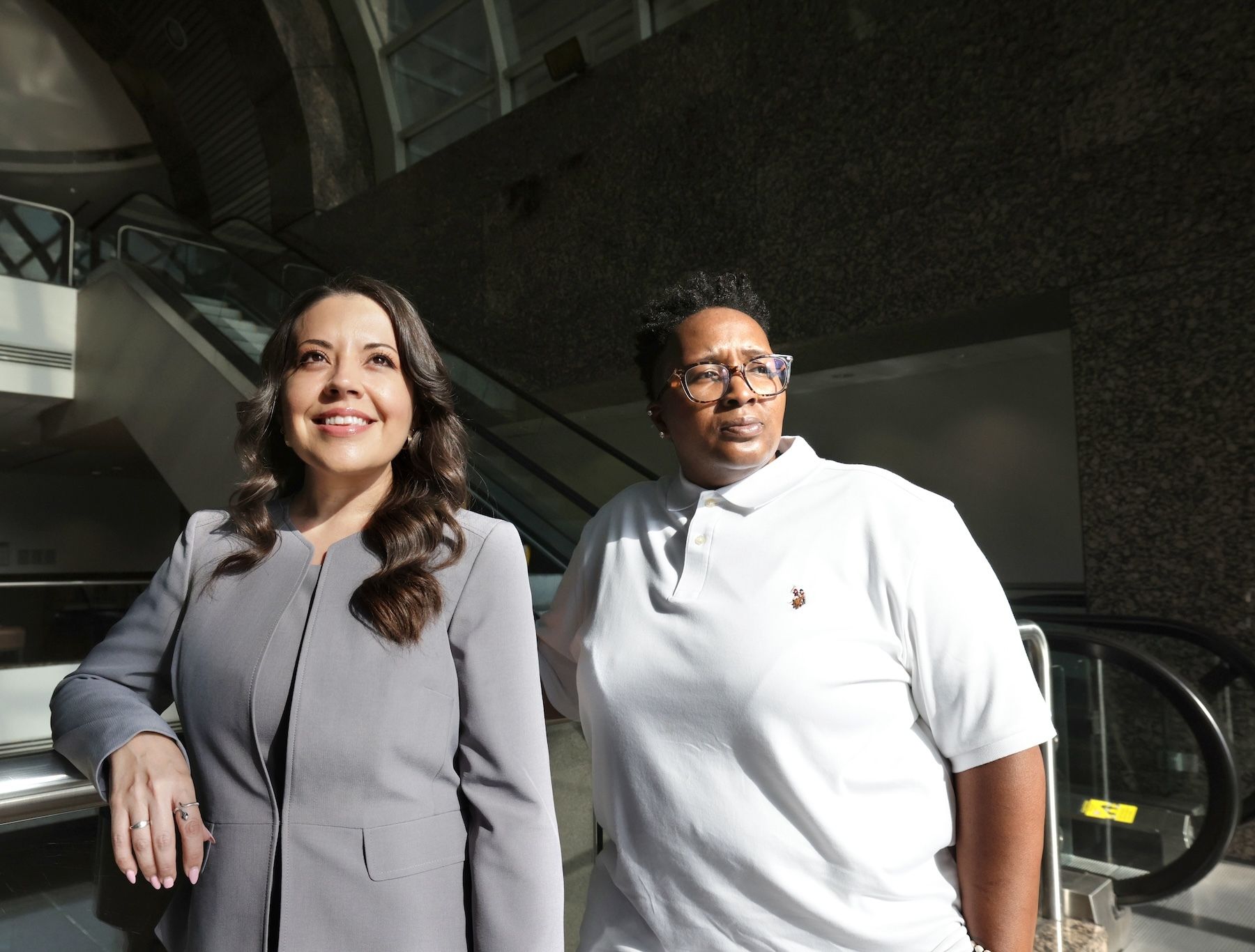- The Lab Report Dallas
- Posts
- Progress, Not Prosecution
Progress, Not Prosecution
In Dallas County, defendants and prosecutors are not always adversaries. How social workers and the District Attorney’s Office found a different path.

Assistant DA Alexandra Guio, left, and Metrocare case manager Kristy Lewis work together to improve outcomes for defendants dealing with mental illness. (Photo by Jason Janik)
Dallas County’s jail has spent much of 2025 operating near its 7,100-person capacity. In response, The Lab Report is examining alternatives to incarceration led by the District Attorney’s Office. Last week, Matt Goodman checked in on the success of a program that allowed officers to take people they would otherwise arrest to a mental health facility instead of jail. This week’s story is below.
Every day, dozens of men and women, all dealing with mental illness and accused of criminal offenses, squeeze into a tiny 6th-floor office at the Frank Crowley Courts Building. They trudge past the festive touches of green streamers and balloons, and knock, or sometimes pound, on the glazed reception window. Encircling the round opening in the glass are printed words of encouragement: “You are not alone. It’s OK not to be OK. We are here to help you.”
Some who arrive at the District Attorney’s Mental Health Division have appointments; others show up unannounced. A few are off their psych meds or high on illegal drugs. One just lost his job, another her temporary housing, and another his cell phone and ID. An older woman is frantic because she can’t navigate the Social Security system. A younger one needs help with her SNAP benefits. One defendant arrives after unexpectedly losing his wife and weeps until he’s nauseated.
A defendant lies down on the floor and refuses to get up; another screams uncontrollably. One day a man recites specific details of how he plans to kill himself. On another, a woman runs outside and begins throwing paperwork, sheet by sheet, and chanting unintelligible words from the courthouse steps.
Still shaking off their latest time behind bars, they arrive with rap sheets reflecting lives in a never-ending loop: Bad decision. Arrest and jail time. Release without resources to treat their core problems. Repeat.
The Dallas County DA’s office knows the pattern well and has offered these lucky few the chance to break the cycle—if they can meet the terms of a pre-trial intervention agreement. Mental Health Division prosecutors will take cases ranging from a Class B misdemeanor to a first-degree felony if community safety is not compromised.
It’s a win for everyone. Wrongdoers get genuine help with their mental health and basic needs such as housing and food. Dallas County’s jail, which has teetered toward its 7,100 capacity in recent months, gets some relief from its double-duty service as a mental institution. Taxpayers get better results for the dollars allocated to aiding this population.
But prosecutors can only do so much. They are attorneys, not social workers or clinicians, equipped mostly with informal connections to help meet urgent needs. The 11 assistant DAs on this team are the only ones at Crowley who shed their adversarial role to work directly with defendants. Many days they feel like ill-equipped therapists, drug counselors, and service providers for housing, food, and transportation.
From my first day of reporting in the Mental Health Division this spring, it was clear many of the participants aren’t capable of independently accessing available services and meeting the program requirements, which include staying out of trouble and getting professional help.
Crawling out of mental illness and substance abuse is impossible when basic needs aren’t met, and about 75 percent of new arrivals don’t even have a place to sleep.
This program, whose pole star “Access to care = Access to justice!” is written in green block-print letters across the reception room wall, remains the best chance for mentally ill individuals to break out of recidivism’s spin cycle. The traditional criminal justice system, especially overcrowded jails, isn’t designed for those with mental illnesses. The best it can do is spit them back into their mayhem with no effective treatment for the core of the behavior that—probably not for the first time—landed them in jail.
Last year, 57 percent of those booked into Dallas County’s jail had a history of receiving state-funded mental health services within the previous three years, according to data provided by the Dallas County Criminal Justice Department. That number was up from 49 percent in 2023 and the highest since the department began enhanced tracking a decade ago.
That’s why the pre-trial intervention initiative matters. It goes after that root problem, and it works. Of the 287 felony and misdemeanor participants who completed the agreements in 2023, only 69, or 24 percent, have landed back in jail. Without intervention, national research shows, the recidivism rate for this population runs anywhere from 50 to 70 percent.
The local statistics reflect stories of lives changed and families reunited. People once jailed on felony arrests are now college graduates with good jobs. Formerly homeless individuals arrested for criminal trespassing now work and live in their own apartments. Others work as counselors who help others with mental health issues.
“I see that happening a thousand times over, and I think that is a societal change,” said Lee Pierson, chief of the DA’s Mental Health Division.

While Mental Health Division prosecutors spend some of their workdays in Frank Crowley courtrooms such as this one, their goal is to get help, not jail time, for individuals. (Photo by Jason Janik)
Yet behind the noteworthy results, prosecutors have come close to drowning in the chaotic, unpredictable, and desperate work. They know the program participants would benefit more from social workers outside the courthouse than attorneys tied to their desks. And they worry about the potential candidates who remain stuck in Lew Sterrett simply because even the most dedicated assistant DA can stretch 24 hours only so far.
Help arrived earlier this year, thanks to a $476,700 federal grant secured by special programs director Marsha Edwards. The division used the money to create a “critical time intervention” team, made up of a handful of case workers and peer specialists. Now the lawyers can mostly stick to legal work, which allows them to take more cases. Metrocare, the county’s largest provider of mental health services, manages the critical social work. In addition, program participants have 24-hour phone access to a Metrocare clinician.
“I thank them a hundred times a day,” prosecutor Alexandra Guio said of her new colleagues. “They have taken such a load off of what we were doing.”
Among Guio’s load was a 67-year-old Dallas woman with more than 20 arrests since 1981, mostly for theft, along with a history of drug abuse and only sporadic treatment for her bipolar, depression, and anxiety disorders.
Cindy, whose name has been changed for this story, was angry each time she had to meet with Guio. She balked at the conditions of her pre-trial intervention agreement, which included staying on her medications. She refused to move out of a hoarder’s nest where she lived with an acquaintance. She missed appointments when the house’s electricity went out and she acknowledged food was scarce.
When she managed to get to a check-in, she wanted only to argue about her latest arrest, for injury to a child. Yes, she had popped a young teenager with her cane, but she insisted he was misbehaving. Guio told new Metrocare case worker Kristy Lewis she was at her wit’s end persuading Cindy to cooperate.
Lewis immediately set specific rules for Cindy, including that she expected her to answer the phone when she called. When that didn’t happen, Lewis and peer specialist Mychelette Thomas headed to her address. Lewis recalled finding a deplorable situation—little food, no power, rooms stuffed with boxes and junk, and Cindy in poor health—and telling her, “This is it. I’m getting you into a boarding home.”
While Thomas shuttled Cindy to Metrocare for her first mental health appointment and sat with her until her prescriptions were settled, Lewis took charge of the move. She also secured DART paratransit services and brought provisions each Thursday from a food bank while helping get SNAP benefits restarted. She and Cindy created a budget and Lewis linked her to senior center activities.
Lewis checked on Cindy regularly for more than two months before slowly pulling back to determine if she could handle responsibilities on her own. During Cindy’s May check-in, she, Guio, and Lewis laughed about her initial stubbornness. “Kristy, you know I was mad at all of you at first,” Cindy told them. “I just thank God for you now. I see the benefits of this program.”
Lewis’ patient, respectful, and tenacious demeanor never changed. She doesn’t get specific about difficulties she’s encountered in her own life, but says these experiences sparked her passion for this work and helped her build a relationship with each client. “There’s always a reason why someone does what they do,” Lewis said. “Until we get to that root cause, it’s best not to judge.”
The Metrocare team, which is currently involved in more than 100 pre-trial intervention cases, spends about half its time at the courthouse and the rest in the field with program participants. Daily to-do lists are often upended by the unexpected.
On a morning in May, Lewis sternly reinforced with one participant the importance of Metrocare appointments and the need to provide medication documents at his Crowley check-ins. “He needs tough love, especially the tough part,” she said after he left. Another man, chin on his chest, mumbled answers to her questions. But when asked about work, he perked up about a job he’s pursuing. Lewis set aside her list and they talked about his hopes that this could be a genuine fresh start.
“I just thank God for you now. I see the benefits of this program.”
When a woman teetered toward hysteria after realizing during her check-in that she wouldn’t be able to complete her contract for several more months, Lewis took charge. After the two women talked for 15 minutes—Lewis encouraged meditative breathing and repeatedly explained the timeline—the meeting with the prosecutor and defense attorney resumed. When the woman arrived home, she called Lewis to say thanks.
The prosecutors and Metrocare staffers triage program participants through three stages. Get them compliant with medication and in stable housing. Connect them to services, from food and transportation to job fairs and child care. Then slowly back away and monitor how they navigate life on their own.
A version of the pre-trial intervention program has been in place for many years, but in 2019, newly-elected District Attorney John Creuzot expanded its work. The Mental Health Division looks at many factors in deciding if an offender is a good match. Those include criminal history and potential threat to community safety, the link between the individual’s mental illness and the crime they committed, and whether the person has had access to behavioral health resources.
“If you’ve got 45 convictions and never had treatment—you just plead and we dumped you back into the system—I’ll take you,” said Pierson, the chief of the division. “If you’re in treatment and shooting somebody, we’re not taking you.”
Nearly all the candidates accepted into the intervention program come from the county jail; most are referred by defense attorneys. Prior to offering the program as an option, prosecutors request assessments be done by Metrocare or the North Texas Behavioral Health Authority. Rather than relying on their limited knowledge for which mental health and substance abuse programs to recommend, the prosecutors now turn to their partners.
“As well-meaning as we are, that’s not our background,” said prosecutor Gaelle Abrey. “The new team knows everything in that moment when it’s needed.”
“They regularly ask for our opinions,” said Tonya Smallwood, the clinical lead for the Metrocare team. “They say, ‘you are the mental experts and we are the legal experts, so let’s figure this out together.’”
The three Metrocare case workers, classified as Qualified Mental Health Professionals, have clinical training; one also has a specialty in substance abuse disorder. They take the lead on reviewing assessments with prosecutors to determine the best course for mental health services and resources for basics such as housing and benefits.
The four peer support specialists, who have first-hand knowledge and understanding of what various program participants are dealing with, provide one-on-one support. They too have gone through specialized training and some of their most important work is knowing when to listen and when to offer advice.
The division’s goal is to reduce recidivism rates by addressing underlying mental health issues. The agreements, made between the state and the defendant, generally begin at one year in felony cases and six months for misdemeanors. If the participant successfully graduates, the DA’s office dismisses the case.
The number of agreements the division currently oversees has increased by almost 100 participants since the end of 2024. As of July 11, 473 felony cases and 144 misdemeanors were in the intervention pipeline. Pierson wants to see the felony number grow to at least 600 by December.

Lawyer Bill Price and Assistant DA Alexandra Guio check in with a young man enrolled in the Mental Health Division’s pre-trial intervention program. (Photo by Jason Janik)
A five-year assessment of the program’s results, completed in September 2022, indicates individuals who meet their contract requirements were significantly less likely to re-offend than those without intervention. Twenty percent of participants were rearrested on a new felony offense within one year of finishing the program and another 15 percent were rearrested within two years.
The study, performed by Dallas-based clinical and forensic psychologist Kristi Compton, cited national research showing recidivism rates for those without intervention in felony offenses range from 50 to 70 percent within one to three years.
Among local misdemeanor offenders who completed intervention agreements, the report said 21 percent of subjects were rearrested for a new misdemeanor offense within one year of completing the program and another 14 percent were rearrested within two years. (National research for misdemeanor offenders without intervention was not available, according to the report.)
Compton's study shows the significant impact on recidivism among a vulnerable population that has historically been ignored after being released from jail. As of June 30, the Metrocare team had found homes for 21 previously unhoused individuals participating in the pre-trial intervention program. Funds from the federal grant covered the $25,000 cost of the cumulative 920 days of housing; Pierson estimated the same time in the county jail would cost about $81,000.
Although the grant ends in September, the Mental Health Division is lobbying to find the dollars—either through the office’s budget or with a new grant—to keep the Metrocare team in place. The latest developments involving program participant Cindy make a strong Exhibit A for Pierson’s argument.
Remember Cindy, who in May was medication-compliant, in stable housing, and excited about senior center activities? She missed her June check-in, then admitted to case worker Lewis she had relapsed on cocaine and marijuana. Cindy was remorseful and embarrassed; she had begun hanging out with someone she knew she should avoid. The relapse meant she lost her spot at the boarding home, but it didn’t cost her what she said was most important—the opportunity to try again.
While Pierson says 80 percent of those who sign a pre-trial intervention agreement eventually graduate, getting mental illness under control is never a straight line. Especially given that many of the participants often turned to substance abuse before getting genuine help, which only makes their situation worse.
At least Cindy had been honest with Lewis, which says a lot about the trust they’ve established. Back on track since late June, she needs support more than ever. What makes the Metrocare team invaluable to the program is they have the skill to pivot, catch the people like Cindy, and get them back into compliance. To get them back on the path—rather than in a jail cell—before they’ve become permanently trapped in the revolving door of traditional criminal justice.
Sharon Grigsby is the co-founder and senior writer of The Lab Report. [email protected].
By the Numbers
7,100: The maximum Dallas County jail population, as authorized by the Texas Commission on Jail Standards.
57%: The percentage of the county’s 2024 jail population that received state-funded mental health services within the previous three years.
49%: The percentage in 2023 that received services in that time frame.
80%: The percentage of participants in the pre-trial intervention program who eventually graduate.
24%: The percentage of 2023 program graduates who have landed back in jail, as compared to a 50-70% recidivism rate for individuals without the program.
617: Number of cases in the pre-trial intervention pipeline as of July 11. That includes 473 felony cases and 144 misdemeanor cases.
We’ll send a new story to your inbox every Wednesday. Have a friend who would appreciate it? We’d love for you to forward this email to them.
The Lab Report Dallas is a local journalism project published by the Child Poverty Action Lab (CPAL). Its newsroom operates with editorial independence.

© 2025 Child Poverty Action Lab. All rights reserved.
